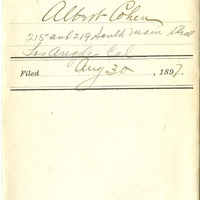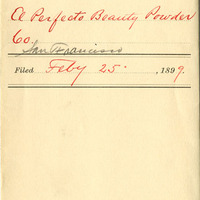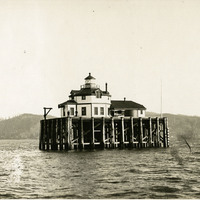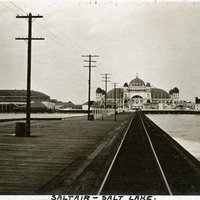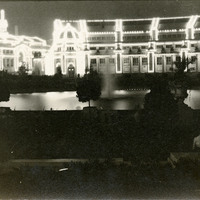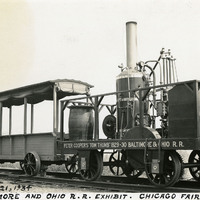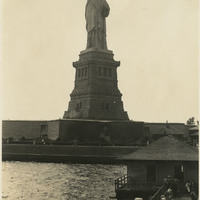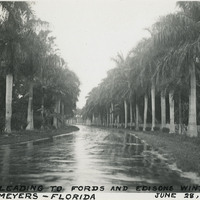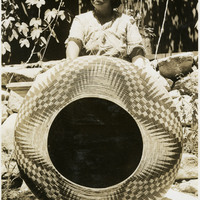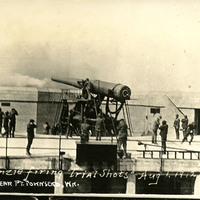Search All Items
- Filters:
- Type
- Image 3607
- Still Image 935
- Text 401
- Text 19
- Image of the California Census from the records of the office of the California Secretary of State 1
- Language
- English 4940
- Spanish 26
- ENGLISH 2
- English 1
- census_013 1
- contra_costa_schedule_1_volume_1 1
Search Results 3541 to 3550 of 5003
-
No Caption: c. 1910. View of the Desdemona Lighthouse, constructed in 1901 or 1902 on wood pilings over a group of shoals at the mouth of the Columbia River. The shoals carry the same name as the lighthouse, both of which are named for the bark Desdemona which ran aground and was destroyed by the shoals in 1857. The lighthouse was automated in 1934, and its light eventually removed in 1965.
Date: 1910
-
Caption: "Saltair -- Salt Lake." View of the first Saltair resort pavilion and surrounding buildings. Constructed in 1893 and designed by Richard K.A. Kletting, the pavilion hovered above the Great Salt Lake on more than 2,000 posts and pilings. The resort was a popular spot for Mormon families, only fifteen miles from Salt Lake City and overseen by Church leaders. The Church sold the building in 1906. It was later destroyed by fire in 1925, but a second pavilion was quickly built.
Date: 1916
-
No Caption: This postcard shows several buildings of the Alaska-Yukon-Pacific Exposition at night, outlined by electric lights. More than 20,000 electric lights were installed on the buildings for the fair. Held in Seattle to celebrate the development of the Pacific Northwest, the fair attracted 3.7 million visitors over the course of its run from June to October 1909. Although most of the fair's buildings have since been destroyed, several of them now serve as part of the University of Washington campus.
Date: 1909
-
Caption: "Sept. 21, 1934, Baltimore and Ohio R.R. Exhibit. Chicago Fair." Shows a replica of the Tom Thumb, an early steam locomotive built by Peter Cooper in 1830 for the Baltimore and Ohio Railroad. This replica was displayed at the Century of Progress Exposition in Chicago, a world's fair celebrating the city's one-hundred year anniversary of incorporation. This photograph was loose in the box with Album 11.
Date: 9/21/1934
-
Caption: "Statue of Liberty, New York." View of the Statue of Liberty on Bedloe Island (now called Liberty Island). Designed by French sculptor Frédéric Auguste Bartholdi, the now-iconic statue was a gift from the people of France to the U.S. Built in segments in France by Gustave Eiffel (also famous for building the Eiffel Tower in Paris), the pieces were shipped from Paris to New York in 1885 and assembled. The Statue of Liberty was subsequently dedicated on October 28, 1886.
Date: 1934
-
Caption: "Stret [sic] Leading to Fords and Edisons Winter Homes, Fort Meyers -- Florida June 28, 1934." Paved street lined by palms and lush vegetation. This road is likely McGregor Boulevard in Fort Meyers. Thomas Edison and Henry Ford purchased adjacent properties in Fort Meyers and built vacation or winter homes that were opened to the public for tours in 1947 and 1990, respectively. The two properties are now known collectively as the Edison and Ford Winter Estates.
Date: 6/28/1934
-
No Caption: Pictured is Yosemite master basket weaver, Lucy Parker Telles, a Mono Lake Paiute, who lived at Yosemite and Mono Lake. Telles was one of a group of Mono-Paiute women renowned for the artistry of their stunning baskets, many of which they sold to Yosemite visitors. Here, Telles poses with her beautiful 36" basket, which took her four years to complete, and which captured first prize at the 1933 World's Fair in Chicago. 1935.
Date: 1935
-
Caption: "Battery Kinzie firing 'Trial Shots' Aug 1, 1912" and "No 10 Near Pt. Townsend, WA." Battery Kinzie was a coastal defense battery designed to include two 12-inch disappearing guns, installed at Fort Worden. Construction began in 1908. It was turned over to the U.S. Army's Coast Artillery Corps in 1912 for use in defending the entrance to Puget Sound. This postcard shows one of the 12-inch guns firing, with several unidentified men standing nearby holding their hands to their ears.
Date: 8/1/1912


